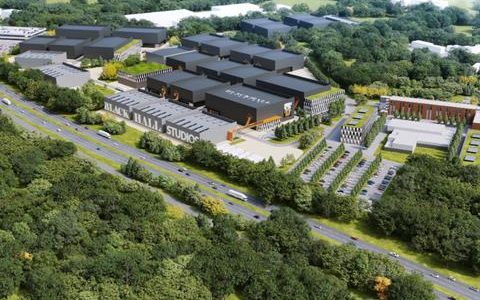An American film production facility has announced its intention to invest £150m in building and running a new film studio complex just outside Reading in Berkshire.

Blackhall Studios – whose Atlanta facilities have been used by production houses including Disney and Warner Bros to shoot such features as Venom and Godzilla: King of the Monsters – had been working with the Department for International Development to find a site and they’re proposing to build sound-stages, from scratch at the Thames Valley Science Park. They hope to have the new facilities operational by early 2022 and say the venture will create about 3000 jobs locally and boost the UK economy by about £500m a year.
Since the pound dropped after the Brexit referendum, Hollywood money has been flooding into the UK. The most recent statistics from the BFI show that last year, inward investment into the UK from foreign producers surpassed £3bn for the first time.
But as investment has been increasing in recent years, pressure on studio space has been causing growing concern both to producers who can’t find anywhere to shoot and bodies such as the BFI or the British Film Commission, which are trying to attract foreign investment to the UK.
Warner Bros has long had its own facilities at Leavesden, near Watford, where much of its Harry Potter studio space is now devoted to a theme park. With Netflix recently signing a long-term deal to take over all the current studio space at Pinewood’s Shepperton site and Disney reaching a similar agreement to use Pinewood’s Iver Heath site, space has become even more scarce for other producers.
In recent years, government agencies and private companies have been doing their best to try to meet the growing demand and progress, through the planning process, has been slow.

But last month, Elstree Studios received planning permission for two new superstages. And a month earlier, Sky announced plans to build a 32 acre complex that it would use for its own productions, as well as hosting productions from Universal Pictures, Focus Features and Working Title.
Shepperton has received planning permission for about 20 new sound stages, Twickenham Studios are planning to run a new studio complex in Liverpool from next year, Peaky Blinders creator Steven Knight is planning a new studio complex in Birmingham and there are plans for a 22 acre studio facility in a former pharmaceutical factory in Dagenham in east London. Elsewhere, there are plans for four new stages in Ashford in Kent.
The Scottish Screen agency is aiming to secure backing for a new studio complex in Scotland and only this week, Belfast Harbour studios submitted planning permission for another six studios, which would make it the UK’s largest studio complex outside of the South East of England.
With the UK’s film and high-end TV industries already benefiting from a weaker pound, attractive tax incentives and high quality facilities and workers, the arrival of the streaming giants such as Netflix and Amazon has only increased pressure on the system. But even though it’s unlikely that every last one of the plans will come to fruition, the ever-growing number of proposals to expand the UK’s supply of studio space, up and down the country, could end up surpassing the currently insatiable demand.
